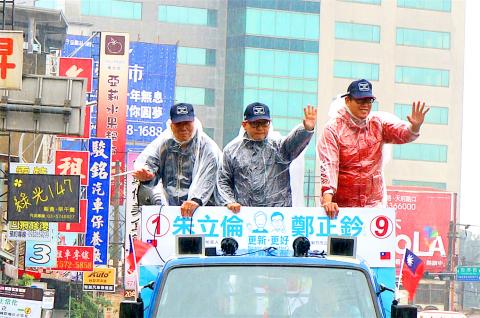Voter turnout for Saturday’s presidential election was the lowest of the six direct presidential elections since 1996, data compiled by the Central Election Commission showed.
Voter turnout in the election was 66.27 percent, compared with 76.04 percent in 1996, 82.7 percent in 2000, 80.28 percent in 2004, 76.33 percent in 2008 and 74.38 percent in 2012, the commission said.
The figures were released alongside the commission’s announcement late on Saturday that Democratic Progressive Party (DPP) Chairperson Tsai Ing-wen (蔡英文) had won the election.

Photo: CNA
Tsai and her running mate, Chen Chien-jen (陳建仁), received 6.89 million votes, or 56.12 percent of total valid votes, commission Chairman Liu Yi-chou (劉義周) said.
Tsai defeated Chinese Nationalist Party (KMT) candidate Eric Chu (朱立倫), who garnered 31.04 percent of the total vote, and People First Party (PFP) candidate James Soong (宋楚瑜), who received 12.84 percent of the vote.
In the legislative race, the DPP won 68 seats out of 113, up from 40 in the previous election four years ago, to give it an absolute majority in the legislature for the first time.
The KMT won 35 seats, sharply down from 64 in the previous election, the commission said.
The New Power Party (NPP) won five seats to become the third-largest party in the Legislative Yuan, followed by the PFP with three seats, the Non-Partisan Solidarity Union with one seat and an independent with the final seat.
The commission said voter turnout in single-member legislative constituency races was 66.58 percent, and 66.25 percent for the political party vote that determined the distribution of legislators-at-large.
Turnout was 57.66 percent for the vote for Aboriginal representatives in mountainous areas and 51.72 percent for the vote for Aboriginal representatives in low-lying areas.
Meanwhile, the commission said that five political parties that have each garnered more than 3.5 percent of the total number of votes cast in legislative elections are eligible to collect NT$50 per vote annually over the next four years, in accordance with the Civil Servants Election and Recall Act (公職人員選舉罷免法).
The New Party, which garnered 4.18 percent of the vote, would also receive subsidies, although it will not hold any legislator-at-large seats.
A record 18 political parties competed in the legislative election and four of them — the DPP, KMT, PFP and NPP — received more than 5 percent of the total votes, making them eligible to be allocated legislator-at-large seats and to receive the election subsidy, commission statistics showed.
It is calculated that the DPP would receive NT$268.54 million (US$7.94 million) each year, given that it garnered more than 5.37 million votes in the legislative election, while the KMT can claim NT$164.04 million and the PFP NT$39.74 million.
The NPP would be eligible to receive NT$37.21 million per year and the New Party NT$25.5 million.

Alain Robert, known as the "French Spider-Man," praised Alex Honnold as exceptionally well-prepared after the US climber completed a free solo ascent of Taipei 101 yesterday. Robert said Honnold's ascent of the 508m-tall skyscraper in just more than one-and-a-half hours without using safety ropes or equipment was a remarkable achievement. "This is my life," he said in an interview conducted in French, adding that he liked the feeling of being "on the edge of danger." The 63-year-old Frenchman climbed Taipei 101 using ropes in December 2004, taking about four hours to reach the top. On a one-to-10 scale of difficulty, Robert said Taipei 101

Taiwanese and US defense groups are collaborating to introduce deployable, semi-autonomous manufacturing systems for drones and components in a boost to the nation’s supply chain resilience. Taiwan’s G-Tech Optroelectronics Corp subsidiary GTOC and the US’ Aerkomm Inc on Friday announced an agreement with fellow US-based Firestorm Lab to adopt the latter’s xCell, a technology featuring 3D printers fitted in 6.1m container units. The systems enable aerial platforms and parts to be produced in high volumes from dispersed nodes capable of rapid redeployment, to minimize the risk of enemy strikes and to meet field requirements, they said. Firestorm chief technology officer Ian Muceus said

MORE FALL: An investigation into one of Xi’s key cronies, part of a broader ‘anti-corruption’ drive, indicates that he might have a deep distrust in the military, an expert said China’s latest military purge underscores systemic risks in its shift from collective leadership to sole rule under Chinese President Xi Jinping (習近平), and could disrupt its chain of command and military capabilities, a national security official said yesterday. If decisionmaking within the Chinese Communist Party has become “irrational” under one-man rule, the Taiwan Strait and the regional situation must be approached with extreme caution, given unforeseen risks, they added. The anonymous official made the remarks as China’s Central Military Commission Vice Chairman Zhang Youxia (張又俠) and Joint Staff Department Chief of Staff Liu Zhenli (劉振立) were reportedly being investigated for suspected “serious

American climber Alex Honnold is to attempt a free climb of Taipei 101 today at 9am, with traffic closures around the skyscraper. To accommodate the climb attempt and filming, the Taipei Department of Transportation said traffic controls would be enforced around the Taipei 101 area. If weather conditions delay the climb, the restrictions would be pushed back to tomorrow. Traffic controls would be in place today from 7am to 11am around the Taipei 101 area, the department said. Songzhi Road would be fully closed in both directions between Songlian Road and Xinyi Road Sec 5, it said, adding that bidirectional traffic controls would